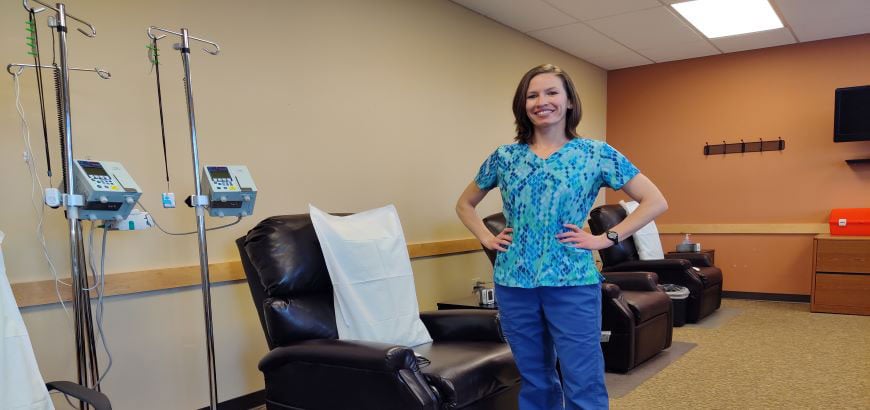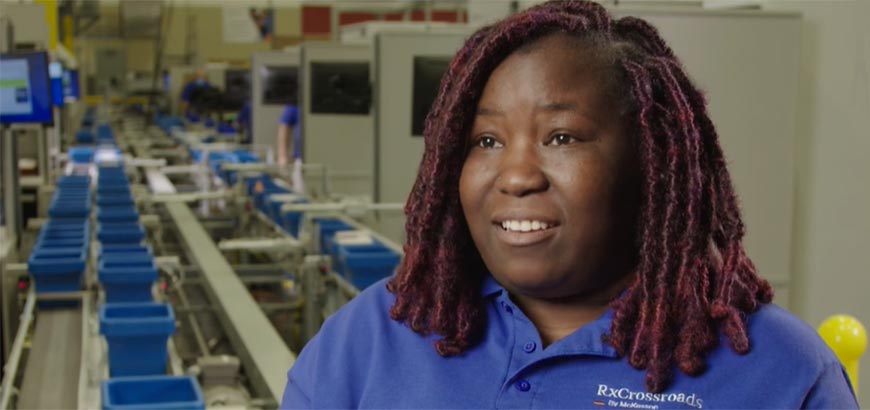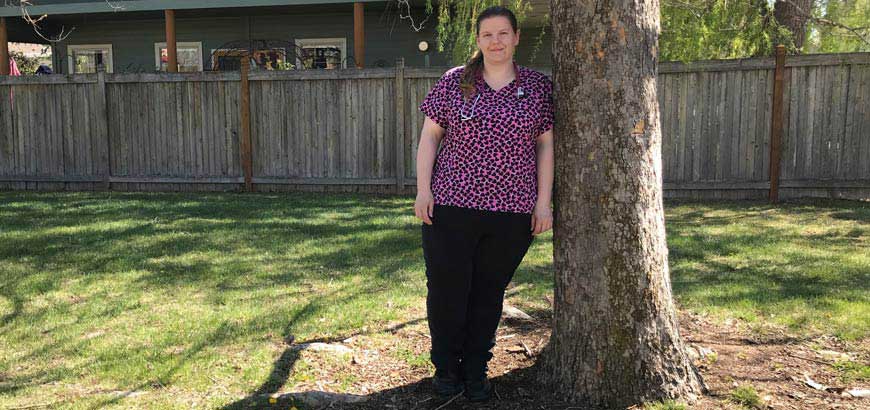Read time: 3.5 minutes
Nursing is in Leslie Dehoyos’ blood.
“My mom was a licensed vocational nurse for 25 years,” Leslie says. “I would visit her at work, and it was inspiring to see her in her element, being compassionate and having the knowledge to help others. Watching her grow throughout her nursing career influenced what I wanted to become.”
For almost a decade, Leslie worked in hospital settings, first as an inpatient oncology nurse and then an outpatient cancer center nurse providing chemotherapy, blood transfusions and other infusion therapies. Two years ago, she was working full-time and studying for her master’s degree in nursing education. Then COVID-19 hit.
“I stepped away from all the changes to focus on my master of science in nursing, and finished my degree four months early,” she recalls. “I worked with the University of Colorado in Colorado Springs as a clinical instructor, and then I started looking for a job where I could put my master’s degree learnings into practice and grow as an educator, while also continuing to see patients as a nurse.”
She joined Intrafusion by McKesson as a senior registered nurse in Colorado Springs, Colo., in 2021. At more than 85 infusion centers across the U.S., Intrafusion leads the way in outpatient infusion management services for specialty practices, delivering roughly 50,000 infusion therapies to patients with chronic conditions every year.
Leslie explains that while she was attracted to Intrafusion for several reasons, she especially appreciated how the ongoing nature of care at Intrafusion allows for more meaningful relationships with patients, as well as the opportunity to educate them about their conditions and treatment.
“Working on an inpatient basis, I felt like I never had time to get to know the patients holistically – not just to care for them medically, but also to be emotionally supportive and better educate them about their health maintenance outside of the hospital,” she says. “They would be discharged, and I’d never see them again. As an infusion nurse, I can be my patients’ resource in understanding what's going on and helping ease their concerns, but I can also see how they’re progressing long-term.”
The infusion center where she works sees up to 40 patients every week. While it’s a busy schedule, Leslie always dedicates valuable time to each person in her care.
“Performing a thorough assessment requires doing more than simply glancing over the questionnaire about my patients’ symptoms and pain levels,” she says. “The most important things for me as a nurse are to listen to my patients, share meaningful knowledge and display compassion when they need it most.”
Beyond getting to spend more quality time with her patients, Leslie was also drawn to the opportunity to work with McKesson’s leadership to drive meaningful change beyond her local clinic.
Just a few months after she joined Intrafusion, she was invited to lead the business’ national Nursing Council. Nurses on the Council listen to one another’s perspectives, learn about how other Intrafusion customer sites are run, and collaborate on improvement opportunities for patients and nurses alike.
“We're actively working to make things better and promote excellent nursing practices and patient experiences across our sites,” she explains. “I can raise a question, concern, or an idea for positive change – big or small – to our corporate leadership, and I always get a reliable response. It’s rewarding for those of us on the frontlines of care to know our voices are being heard and are making an impact.”
Leslie has also been able to apply her advanced education to help Intrafusion’s nurse educator develop solutions that benefit nurses and patients.
“I’ve been researching and implementing improved alternatives for how we administer certain medications, as well as evidence-based studies and practices around pre-medications to find a better way to prevent infusion reactions,” she says. “There's a lot coming down the pipeline, and it's a thrill to be involved with it.”
At the end of the day, Leslie’s goal remains the same – always provide the best care possible while empowering patients to take control of their health status.
“I feel like my job as a nurse is to find the answers to whatever questions are raised through a patient’s treatment journey, whether that’s in our direct care or our behind-the-scenes operations,” she says. “I see this problem or that barrier, and I try to find how to fix it or learn from it. It's fulfilling when I get to support my patients by unlocking the locks.”




Share
Post
Post
Email